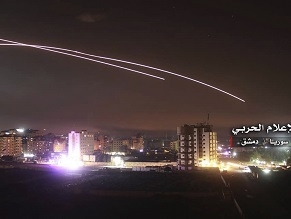|
World Jewish News

Illustrative: Missiles rise into the sky as Israeli missiles hit air defense position and other military bases, in Damascus, Syria, May 10, 2018. (Syrian Central Military Media, via AP)
|
Liberman rejects Russian ‘restrictions’ on Israeli strikes in Syria
26.10.2018 Defense Minister Avigdor Liberman on Thursday rejected reported demands by Moscow that Israel give the Russian military additional warning before carrying out airstrikes in Syria.
“We will not accept any restrictions on our freedom of operation, and when it comes to national security, we will take action,” Liberman told Army Radio in an interview.
He indicated that Israel has carried out more airstrikes in Syria than have been attributed to it by foreign media.
“Just because the media did not report on Syria strikes does not mean there were none,” Liberman said. “I don’t think it’s our duty to report what the army must do. An army needs to act.”
On Wednesday, Hadashot news reported that Russia was seeking to reset the terms of Israeli military operations in Syria and overhaul the existing Jerusalem-Moscow coordination system.
Russia is insisting it receive further advance warning of Israeli strikes, the TV network said, though the report did not say how much. Israel usually informs Russia minutes before an airstrike.
Such a demand would likely limit Israel’s freedom of maneuver in Syria, with the report noting it could endanger Israeli aircraft and allow Iranian operatives more time to hide materiel being targeted.
A senior diplomatic source quoted in the report said the demand was unacceptable operationally and that Israel must not acquiesce to it.
The reported Russian demand comes a month after Moscow announced it would supply Syria with the S-300 air defense system, after one of its military planes was downed by a Syrian missile during an Israeli strike in the country.
Moscow has blamed Israel for the incident, in which 15 Russian servicemen were killed, saying an Israeli jet had used the Russian plane as cover — a charge denied by Israel.
On Wednesday, a satellite imaging company published photos it said show four S-300 batteries deployed at a newly constructed site near the northwestern Syrian city of Masyaf, where Israel has reportedly carried out raids on targets allegedly tied to Syria’s chemical weapons program.
ImageSat International said the S-300s did not appear to be operational and it was unclear whether the systems were being manned by Russians or Syrians. It also noted the site was 1.3 kilometers from a Russian S-400 anti-aircraft battery, which is considered to be one of the most advanced air defense systems in the world, and and that the type of construction being seen was consistent with the placement of missile launchers.
The S-400 batteries are thought to be manned solely by Russians to protect Moscow’s interests in the country.
Israeli leaders have vowed to continue carrying out strikes in Syria amid tensions with Russia over the downing of the Russian military reconnaissance plane, though no airstrikes have been attributed to Israel since the September 17 incident.
The Israeli Air Force has carried out hundreds of strikes in Syria in recent years against targets linked to Iran and its Lebanese proxy Hezbollah, who Israel says are working to establish a military presence there that could threaten the Jewish state.
Like Russia, both Iran and Hezbollah are fighting on behalf of Syrian President Bashar Assad’s regime in the Syrian civil war.
By TOI STAFF. Alexander Fulbright conrributed to ths report.
Times of Israel
|
|
